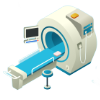Cancer refers to a group of illnesses that result from cells in the body growing abnormally. These cells divide and produce new cells in an uncontrolled way that can spread through out the body and cause damage to essential organs.
The world’s population is expected to be 7.5 billion by 2020 and approximations predict that about 15.0 million new cancer cases will be diagnosed; with deaths of about 12.0 million cancer patients. In fact the most of cancer is 100% curable if there is an early detection or even the detection at late stage is also curable if proper therapy is given.



